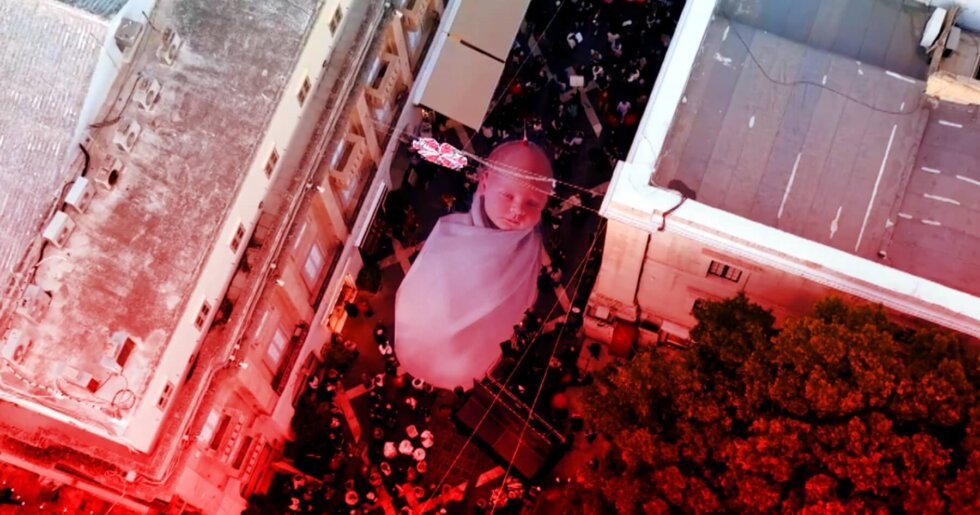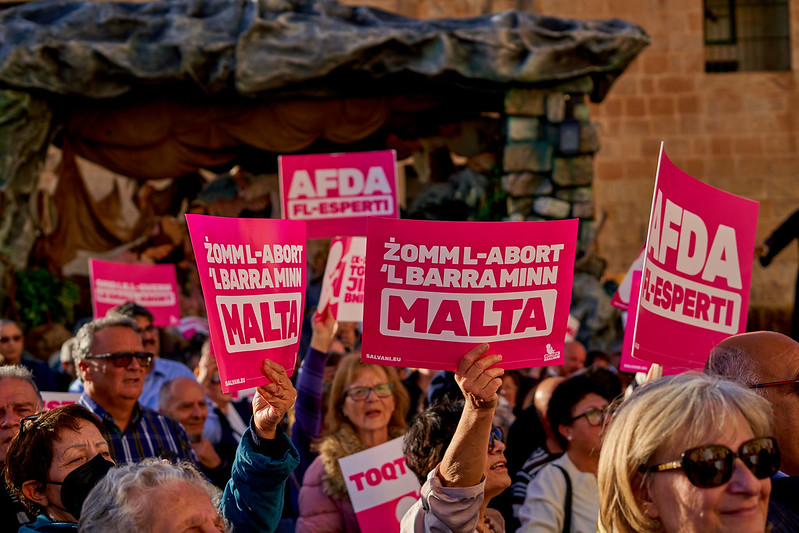
How Malta pro-lifers successfully stopped abortion
Malta has just won a stunning victory against abortion. Here’s what happened and what we can learn.
In 2022, the battle to retain Malta’s pro-life stance on abortion took a new turn.
In June of that year, a pregnant US citizen by the name of Andrea Prudente, was on holiday in Malta when she was allegedly denied a ‘life-saving’ abortion. This story was quickly picked up by media outlets across the globe, who jumped at the chance to call Malta’s pro-life legislation into question.
However, the full facts of the case were yet to be revealed. Professor George Gregory Buttigieg, professor of obstetrics in Malta, responded to the news by reiterating the country’s legal stance on abortion:
“Maltese law and medical precedent are absolutely clear: if a woman’s life is at risk from her pregnancy, then it is absolutely legal for her pregnancy to be ended by delivering the child, even if that child has a heartbeat, and even if the child will sadly pass away. This would not be seen in Maltese law or medicine as an abortion.
As a Professor of Obstetrics, I have delivered babies prematurely in life threatening situations and have never been worried about legal repercussions”.
What’s more – the initial, key circumstances surrounding Prudente’s situation were seemingly misrepresented. The chair of the Maternity and Gynaecology Department at the hospital where Prudente was treated, Professor Yves Muscat Baron, testified that Prudente “had never been in danger of death”.
But, for news outlets and abortion campaigners, this hardly mattered. The sensational headlines about a predominantly pro-life country denying a pregnant woman a ‘life-saving abortion’ were already going viral. This story resembles a similar case in Ireland back in 2012, concerning the tragic death of Savita Halappanavar. As Right to Life UK wrote:
“This mirrored what has been seen with the Savita Halappanavar case in the Republic of Ireland in 2012. Initial reports from a campaigning journalist at the Irish Times had claimed that Savita had died because she had been refused an abortion under Ireland’s pro-life legislation.
However, in 2013, a coroner’s inquest found that Savita Halappanavar had not died as a result of Ireland’s pro-life legislation. The exhaustive investigation established that the actual cause of her death was an infection with a virulent antibiotic-resistant strain of E.coli compounded by a series of system failures.
Two additional investigations, undertaken by the Irish Health watchdog HIQA (Health, Information and Quality Authority) and an independent report for the Irish Health Service (the HSE), found that her death was due to medical failures.”
However, mirroring the more recent story of Prudente, the results of these investigations didn’t make a difference to the opinions already formed - largely as a result of the mainstream media coverage of Savita’s death.
As reported by Right to Life:
“By the time the results of the inquest and two additional investigations were published, like Malta, the outcomes of these investigations were not widely reported internationally and pro-abortion campaigners had already used the case to build a large amount of momentum for their campaign to repeal Ireland’s eighth amendment, which recognised the equal right to life of the pregnant woman and the unborn.
Large amounts of money flooded into Ireland from pro-abortion organisations and billionaire donors overseas following the case of Savita Halappanavar’s death, with the specific goal of removing Ireland’s pro-life legislation, and so Ireland came under intense pressure internationally to change its legislation.”
Subsequently, Ireland mirrored Malta in more ways than one - with international pressure then shifting to Malta’s pro-life laws.
November 2022
Due to mounting local and international pressure from abortion campaigners and supporters between the months of June and November, the Maltese government brought forward an abortion Bill to parliament. Although the government, led by Prime Minister Robert Abela, had previously indicated that any proposed change to the text of abortion legislation in the country would simply codify into law the current practice (physicians continue to be able to intervene, even if this results in the undesired death of the unborn child, when a pregnant woman’s life is deemed threatened due to the continuation of the pregnancy). This is not what happened. Right to Life wrote:
“However, the Bill which received a First Reading in the Maltese Parliament on the afternoon of 21 November 2022, went much further than simply codifying current practice into law. Instead, the amendment that was proposed included legalising abortion to protect the health of a pregnant woman who has medical complications that “may” put her “health in grave jeopardy”.”
This wording would essentially open the floodgates to a much, much higher rate of abortion in the country. As Dr. Calum Miller, doctor and research associate at the University of Oxford specialising in abortion policy, said at the time:
“The government of Malta has announced a Bill allowing abortion for ‘health’ reasons. This is without any doubt an open gate to abortion on demand. Everyone who knows pro-life people in or from Malta should contact them now to alert them to this imminent danger. For example, Great Britain legalised abortion only for health reasons in 1967, a law still in place. Yet 1 in 4 pregnancies in GB end in abortion, 200,000 a year. This is abortion on demand by stealth”.
The Maltese Government did not acquiesce, stating that their intention was to simply codify existing practice around abortion into law, and implications or statements on the contrary were simply attempts to “scaremonger”.
This was in-spite of the position paper issued by over 80 academics in Malta which expressed “grave concern” over the Bill, as it would effectively allow abortion up to birth.
The pressure was on - largely due to the fact that the government in Malta enjoyed a majority in parliament, holding over half (56%) of the seats. It seemed almost an inevitability that the Bill would pass, especially with the added urgency that the government were showing in their efforts to push the Bill through before Christmas - less than 5 weeks after it received its First Reading.
This was especially upsetting to pro-lifers all over the world, but most of all to the people of Malta - who have long been deemed citizens of one of the most pro-life countries in the world.
A poll as recently as 2019 showed that over 90.2% opposed unrestricted abortion in the first 3 months of pregnancy, and a massive 97% opposed unrestricted abortion throughout all of pregnancy. So, one thing was clear: the people of Malta would not let the law change without a fight.
Life Network Malta, along with other pro-life campaigners and groups, began their campaign. At the forefront was Dr. Miriam Sciberras, one of the most well-known pro-life figures in Malta (click here for Dr. Miriam’s interview with the All-Ireland Rally for Life in 2021).
From Right to Life:
“Dr Miriam Sciberras is a very prominent pro-life figure in Malta who had led the fight for decades to keep abortion out of the country. As well as being a full-time dentist and mother to nine, Dr Miriam has become the most recognisable face on Maltese broadcast television when it comes to debates on abortion, along with her work to run education programmes in schools, lobbying efforts in Parliament, large national campaigns and rallies, as well as providing emotional and material support to mothers with unplanned pregnancies.
The tireless Dr Miriam has not stopped there. Acknowledging that stopping abortion coming to Malta is only half the battle, she has worked tirelessly setting up pregnancy support centres and housing for women, so that they have had the support in place so they do not feel they have to seek an abortion when they are faced with an unplanned pregnancy.
Thousands of lives have been saved by the work of Dr Miriam Sciberras, Life Network and the wider pro-life movement in Malta, and thousands of women facing unplanned pregnancies have been supported by their work.

There was no way that Dr Miriam was going to be letting abortion into Malta and she set to work.”
Volunteers and campaigners for life got together and launched what was to be the biggest pro-life campaign Malta has ever seen. The campaign was titled Inti Tista’ Ssalvani - “you can save me”. This name was a direct appeal to the population to act now, as lives depended on them making their voices heard and not backing down.
Given the huge backing for the Bill by the government, it was obvious to the campaigners that the only way to fight this was to mobilise the country against the Bill, by making the cruel reality of the Bill clear to the public. As Right to Life commented:
“This would ensure that it became clear to the Government that if the Bill passed, they would likely lose at the next general election – and that they would have to undertake a major ‘u-turn’ in order to save themselves from a major electoral defeat.”
Just one day into the launch of the campaign, the MP’s reported that they had received more emails, phone calls and visits in relation to this Bill than any other in the history of the country. Here we truly see the importance of making your voice heard: the value of it cannot be stressed enough. But more was still needed, so the pro-life Maltese public took to the streets and rallied hard against the abortion Bill in the country's capital, Valletta.
The rally was held on December 4th, a Sunday. Even with extremely short notice, and a small team on a shoe-strong budget, the leaders and volunteers involved in the Inti Tista’ Ssalvani campaign, managed to hold one of the largest protests in recent Maltese history - with 20,000 people taking to the streets - a huge turnout for tiny Malta.

Pro-life supporters in the rally placed a large banner depicting a newborn baby on the front steps of the Castille - the Prime Minister’s office. From there, the thousands of pro-lifers continued on to Republic Street, led by Marie-Louise Coleiro Preca - the former president of Malta.
To fully understand the enormity of the rally turn-out, Right to Life gives this comparison:
“To put in perspective how big a turnout this was, a turnout from the same proportion of the population in the UK would see over 2.6 million people take to the streets of London – the largest protest in UK history, the 2003 Stop the War protest, had an estimated 1.2 million turnout in London.”
The afore-mentioned banner of the newborn baby was carried on the shoulders of around 50 pro-life people attending the rally as the crowd marched through the streets. Impressive drone footage of the event can be seen below:
The rally ended with speeches from various prominent pro-life figures, most notably perhaps was that of former president, Marie-Louise Coleiro Preca.
In her speech, she highlighted the appeal to the government to “meet with experts, civil organisations, to discuss with the stakeholders”, and to consider and take note of the position paper mentioned above, where 80 academics expressed their deeply felt concerns over the implications of the proposed Bill. The former president also strongly urged members of the media to consider “the rights of the mother and the child that is without a voice”. In addition, Giovanni Bonello, a retired judge, observed that the proposed Bill, if passed into law, would allow for “abortion on demand”, and argued that there already existed adequate protection for women, nurses and doctors under current Maltese law. He stated that “No nurse, no doctor, or woman was taken to court because the pregnancy was terminated to safeguard the mother’s life”.
The impact
There was radio silence from the Maltese government, who had initially desired to rush the Bill into law by Christmas. While each day-long delay meant more lives saved - and therefore was a victory in and of itself - the real, bigger picture was stopping the Bill altogether. Therefore, Maltese pro-lifers continued their coordinated efforts to keep pressure on the government, for however long that would take.
Additional pressure was added in June 2023, when Malta’s president, George Vella announced that if the Bill were to pass into government, he would resign. This would have been a stain on the country's history, as it would have been the first resignation of a sitting president in Malta’s history as a republic. This was not something the Prime Minister, Robert Abela, wanted.
Victory
Finally, in June 2023, the government of Malta made such changes to the proposed Bill that it now received support from the Nationalist Party - who initially opposed it. Pro-life members of the public also confirmed that the new wording of the Bill “does not introduce abortion to Malta but would codify the existing life-saving practices currently being applied in Malta, and provide further safeguards for mothers, unborn babies, and doctors”.
The leader of the winning Inti Tista’ Ssalvani campaign, Dr. Miriam Sciberras, stated:
“The voice of the people of Malta has been very clear: we are a pro-life nation, valuing every life, the mother that deserves our utmost protection especially when in difficulty, the unborn child that today we have saved, thanks to this new version of the legislation, we will continue to do this”.
This is an amazing victory for the country of Malta, who’s admirable pro-life citizens can rest easy knowing they have directly saved countless lives by their hard work. Although abortion campaigners are blood-thirsty and relentless, and this won't be the last time Malta’s pro-life nation needs to fight for the right of the unborn, this inspiring story should stand as an example and reminder to all pro-life people: Life Will Win.

Featured
- Man jailed for 9 years for forced abortion
- Abortion coercion has arrived in Ireland – the NWC are silent
- Review of at-home abortions 'needed after coercion case'
- French Govt to remind 29-year-olds of biological clock
- Huge factor in decline in primary school numbers ignored
- Germany Denies Promoting Abortion Abroad—While Funding Pro-Abortion NGOs
- Govt don’t oppose Coppinger abortion bill at 1st stage
- March for Life: Vance, the White House, and a Divided Pro-Life Movement
- Paris’ Annual March for Life Puts Euthanasia in the Spotlight
- Britain’s seemingly limitless abortion rate
- The importance of the work carried out by Every Life Counts
- Puerto Rico officially recognizes unborn children as ‘natural persons’
- Assisted suicide laws stalled by “complex” legal issues
- Yes, that hideous celebration of 300 abortions is real
- White Crosses Memorial: Dungarvan once again pays its respects to our aborted babies
- Josiah: Abortion Survivor
- Rally for Life 2025



























